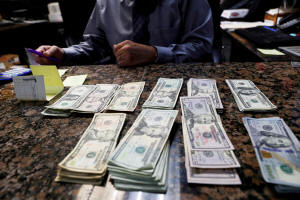Fiscal stimulus fires up U.S. consumer spending; inflation benign
 Send a link to a friend
Send a link to a friend
 [February 27, 2021] By
Lucia Mutikani [February 27, 2021] By
Lucia Mutikani
WASHINGTON (Reuters) - U.S. consumer
spending increased by the most in seven months in January as the
government doled out more pandemic relief money to low-income households
and new COVID-19 infections dropped, positioning the economy for faster
growth in the first quarter.
Despite the strong rebound in consumer spending reported by the Commerce
Department on Friday, price pressures were muted. Inflation is being
closely watched amid concerns from some quarters that President Joe
Biden's proposed $1.9 trillion COVID-19 recovery package could cause the
economy to overheat.
The plan, being considered by the U.S. Congress, would be on top of a
rescue package worth nearly $900 billion approved by the government in
late December. Federal Reserve Chair Jerome Powell has played down the
inflation fears, citing three decades of lower and stable prices.
"Thanks to Washington, the economic outlook in the near future is
sunny," said Sung Won Sohn, finance and economics professor at Loyola
Marymount University in Los Angeles.

Consumer spending, which accounts for more than two-thirds of U.S.
economic activity, jumped 2.4% last month. That was the biggest gain
since last June and ended two-straight monthly declines. Personal income
shot up 10%, the largest increase since last April when the government
disbursed the first round of stimulus checks. Income rose 0.6% in
December.
Graphic: Personal consumption - https://graphics.reuters.com/USA-STOCKS/azgvoeeaqvd/perscons.png
The recent stimulus package included $600 checks to mostly low-income
and some middle-income Americans. The package also extended a
government-funded weekly unemployment subsidy as well as benefits for
millions of people who do not qualify for state unemployment programs as
well as those who have exhausted their six months of eligibility. These
benefits expire in mid-March.
The consumer spending report added to upbeat data this month on
manufacturing output, building permits and home sales.
Consumers bought motor vehicles, recreation goods, food and beverages.
They also boosted spending on services such as hotel accommodations and
restaurants, as well as doctor visits.
Economists polled by Reuters had forecast consumer spending rebounding
2.5% in January and income accelerating 9.5%.
U.S. stocks were trading lower. The dollar rose against a basket of
currencies. U.S. Treasury yields fell.
When adjusted for inflation, consumer spending increased 2% last month
after decreasing 0.8% in December. But robust consumer spending is
drawing in imports.
In a separate report on Friday, the Commerce Department said the goods
trade deficit increased 0.7% to $83.7 billion last month, with imports
outpacing a rise in exports. The department also reported a 0.6%
decrease in retail inventories, though stocks at wholesalers surged
1.3%.
The drag on economic growth from the widening goods trade deficit and
slower pace of inventory accumulation will likely be blunted by the
strong consumer spending.
Following this month's slew of solid reports, Morgan Stanley raised its
first-quarter gross domestic product growth estimate to an 8.1%
annualized rate from a 7.3% pace. Growth forecasts for the quarter were
boosted last week from as low as a 2.3% pace. The economy grew at a 4.1%
rate in the fourth quarter.
[to top of second column] |

Carlos Gonzalez, managing partner of the Oz Ladies' and Gentlemen's
Nightclub, counts money ahead of the Tampa Bay area weekend NFL'
Super Bowl LV amid the ongoing spread of the coronavirus disease
(COVID-19) at in Clearwater, Florida, February 5, 2021.
REUTERS/Shannon Stapleton/File Photo

There are indications that the White House's massive stimulus package could be
fully approved next month. It would send additional $1,400 checks to qualified
households and extend the government safety net for the unemployed.
Further gains in consumer spending are likely, though winter storms, which
wreaked havoc in Texas and other parts of the densely populated South this
month, could slow momentum. Daily coronavirus cases and hospitalizations have
dropped to levels last seen before the Thanksgiving and Christmas holidays,
while the pace of vaccination is picking up.
While a third report from the University of Michigan showed its consumer
sentiment index dipping this month from January, a survey from the Conference
Board this week showed an improvement in confidence among households.
Graphic: Consumer sentiment - https://graphics.reuters.com/USA-STOCKS/gjnpwzzjmvw/umich.png
Inflation was benign last month. The personal consumption expenditures (PCE)
price index excluding the volatile food and energy component rose 0.3% after a
similar gain in December. In the 12 months through January, the so-called core
PCE price index increased 1.5% after advancing 1.4% in December.
The core PCE price index is the Fed's preferred inflation measure for its 2%
target, a flexible average.
Graphic: Inflation - https://graphics.reuters.com/USA-STOCKS/ygdpzeekovw/inflation.png
Powell this week told lawmakers that the U.S. central bank would keep interest
rates low and continue to pump money into the economy through bond purchases "at
least at the current pace until we make substantial further progress towards our
goals (maximum employment and inflation)."
There is ample slack in the labor market, with at least 19 million people on
unemployment benefits.

Income last month was boosted by a 52% surge in government transfers. It was
also supported by a 0.7% rise in wages. Excluding the government largesse income
at the disposal of households after inflation fell 0.5%.
Some of the stimulus money sent to households was stashed away, hoisting the
saving rate to 20.5% from 13.4% in December.
"We expect an additional stimulus package passed in March to raise the savings
rate further, adding to a powerful tailwind of buying power that has been
building among U.S. households, ready to be deployed as the economy is
reopening," said Ellen Zentner, chief economist at Morgan Stanley in New York.
(Reporting by Lucia Mutikani; Editing by Alex Richardson and Andrea Ricci)
[© 2021 Thomson Reuters. All rights
reserved.] Copyright 2021 Reuters. All rights reserved. This material may not be published,
broadcast, rewritten or redistributed.
Thompson Reuters is solely responsible for this content. |